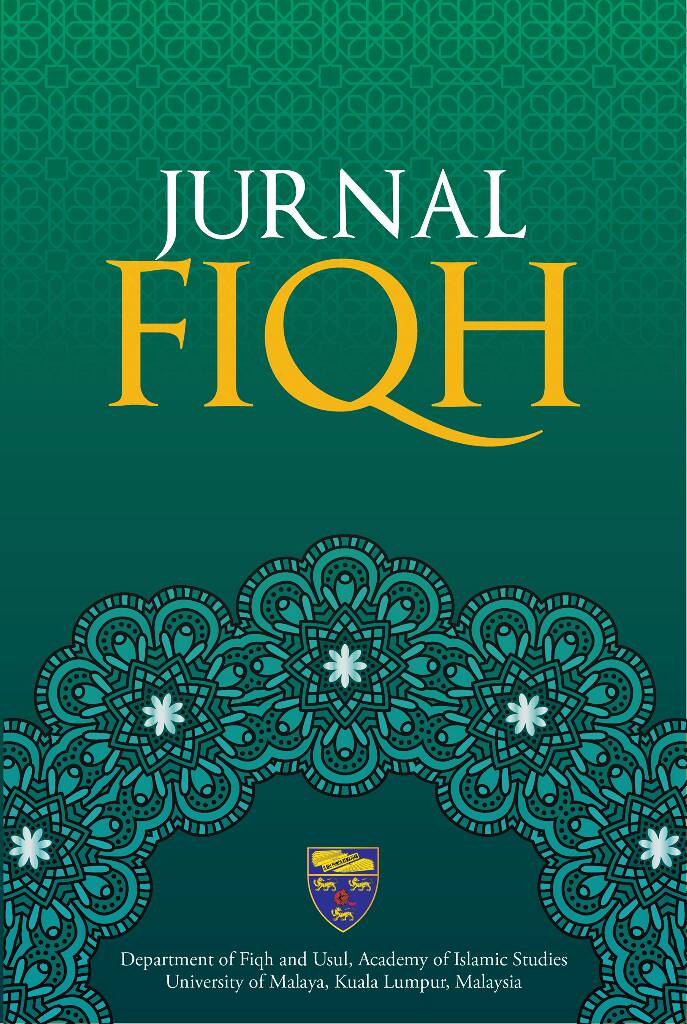Exploring The Ethical Governance of Artificial Intelligence from An Islamic Ethical Perspective
DOI:
https://doi.org/10.22452/fiqh.vol22no1.5Keywords:
Artificial Intelligence (AI); Islamic Ethics; Ethical Governance; Maqasid al-Shariah; Algorithmic AccountabilityAbstract
This study aims to examine the intersection of contemporary artificial intelligence (AI) with Islamic ethics, specifically exploring how foundational Islamic ethical principles can guide the integration and governance of AI technologies. Employing a theoretical and conceptual analysis method, the research investigates epistemological and theological considerations related to the application of machine learning algorithms in interpreting sacred Islamic texts. The core theoretical underpinnings guiding this analysis include Tawḥīd (the Oneness of God), which emphasizes harmony and ethical coherence; Maqāṣid al-Sharīʿah (Objectives of Islamic Law), focusing on safeguarding fundamental human interests such as faith, life, intellect, progeny, and wealth; Ihsan (Excellence and Benevolence), advocating for moral excellence in technological applications; and ʿAdl (Justice), which demands equity and fairness in technological advancements. The findings indicate that while AI holds significant promise for enhancing societal welfare, education, healthcare, and economic justice within Muslim communities, it presents profound ethical challenges, including algorithmic bias, privacy infringement, human autonomy erosion, and accountability concerns. The study highlights the necessity of rigorous ethical oversight grounded in Islamic ethics to navigate these challenges, proposing that AI applications adhere to principles of justice, transparency, and the preservation of human dignity and autonomy. The implications of this research extend beyond theoretical considerations, underscoring the importance of interdisciplinary collaboration between Islamic scholars, ethicists, policymakers, and technologists. Islamic ethical guidelines can enrich global conversations on AI ethics, ensuring technological innovations align with universally recognized moral standards while promoting social justice and human flourishing.
Downloads
References
A Shaji George, “Preparing Students for an AI-Driven World: Rethinking Curriculum and Pedagogy in the Age of Artificial Intelligence,” Partners Universal Innovative Research Publication 1 (2023).
Abdulaziz Sachedina, Islamic Biomedical Ethics: Principles and Application. New York City: OUP USA, 2009.
Al-Hasan Al-Aidaros, Faridahwati Mohd Shamsudin, and Kamil Md Idris, “Ethics and Ethical Theories from an Islamic Perspective,” International Journal of Islamic Thought 4 (2013).
Amana Raquib, Bilal Channa, Talat Zubair, and Junaid Qadir, “Islamic Virtue-Based Ethics for Artificial Intelligence,” 2 (2022).
Antonio Torres Fernández, “Tawḥīd and Islamic Philosophy: Exploring the Unity of God in Islamic Logic,” AnNahdlah: Journal of Islamic Studies 1 (2023).
David Elliott, and Eldon Soifer, “AI Technologies, Privacy, and Security,” Frontiers in Artificial Intelligence 5 (2022).
Eirini Ntoutsi, Pavlos Fafalios, Ujwal Gadiraju, Vasileios Iosifidis, Wolfgang Nejdl, Maria‐Esther Vidal, Salvatore Ruggieri, Franco Turini, Symeon Papadopoulos, and Emmanouil Krasanakis, “Bias in Data‐driven Artificial Intelligence Systems—An Introductory Survey,” Wiley Interdisciplinary Reviews: Data Mining and Knowledge Discovery 10 (2020).
Ekkehardt Ernst, Rossana Merola, and Daniel Samaan, “Economics of Artificial Intelligence: Implications for the Future of Work,” IZA Journal of Labor Policy 9 (2019).
Emilio Ferrara, “Fairness and Bias in Artificial Intelligence: A Brief Survey of Sources, Impacts, and Mitigation Strategies,” Sci 6 (2023).
Eta S Berner, and Mark L Graber, “Overconfidence as a Cause of Diagnostic Error in Medicine,” The American Journal of Medicine 121 (2008).
Feijóo, Claudio, Youngsun Kwon, Johannes M Bauer, Erik Bohlin, Bronwyn Howell, Rekha Jain, Petrus Potgieter, Khuong Vu, Jason Whalley, and Jun Xia, “Harnessing Artificial Intelligence (AI) to Increase Wellbeing for All: The Case for a New Technology Diplomacy,” Telecommunications Policy 44 (2020).
Ferdinand Salomo Leuwol, Sam Hermansyah, Abdul Wasik, Husna Amin, and Sitti Nur Alam, “Adaptive AI Framework for Dynamic Sharia Compliance in Indonesian Islamic Finance: An Ethical and Religious Perspective,” International Journal of Financial Economics 1 (2024).
Fontes, Catarina, Ellen Hohma, Caitlin C Corrigan, and Christoph Lütge, “AI-Powered Public Surveillance Systems: Why We (Might) Need Them and How We Want Them.” Technology in Society 71 (2022).
George Benneh Mensah, “Artificial Intelligence and Ethics: A Comprehensive Review of Bias Mitigation, Transparency, and Accountability in AI Systems,” Preprint (2023).
Hagendorff, Thilo, Leonie N Bossert, Yip Fai Tse, and Peter Singer, “Speciesist Bias in AI: How AI Applications Perpetuate Discrimination and Unfair Outcomes against Animals,” AI and Ethics 3 (2023).
Jess Whittlestone, Rune Nyrup, Anna Alexandrova, Kanta Dihal, and Stephen Cave. Ethical and Societal Implications of Algorithms, Data, and Artificial Intelligence: A Roadmap for Research. London: Nuffield Foundation, 2019.
John L. Esposito, The Oxford History of Islam. New York City: Oxford University Press, 1999.
Klemens Katterbauer, and Philippe Moschetta, “A Deep Learning Approach to Risk Management Modeling for Islamic Microfinance,” European Journal of Islamic Finance 9 (2022).
Mariam Sherwani, “The Right to Privacy under International Law and Islamic Law: A Comparative Legal Analysis,” Kardan J Soc Sci Humanit 1 (2018).
Mohamad Aniq Aiman Alias, Mohd Rushdan Mohd Jailani, Wan Abdul Fattah Wan Ismail, and Ahmad Syukran Baharuddin, “The Integration of Five Main Goals of Shariah in The Production of Science and Technology for Human Well-Being,” AL-MAQASID: The International Journal of Maqasid Studies and Advanced Islamic Research 5 (2024).
Mohammad Hashim Kamali, “Between Separation and Unity: The Interplay of Law and Morality in Islamic Jurisprudence,” Sharia Law In The Twenty-First Century. London; Hackensack, NJ: World Scientific, 2022.
Mohammad Hashim Kamali, “Methodological Issues in Islamic Jurisprudence” Arab Law Quarterly 11 (1996).
Mohammad Yousuf Rathor, Azarisman Shah, and Mohammad Hadzri Hasmoni, “Is Autonomy a Universal Value of Human Existence? Scope of Autonomy in Medical Practice: A Comparative Study between Western Medical Ethics and Islamic Medical Ethics” IIUM Medical Journal Malaysia 15 (2016).
Mohd Istajib Mokhtar, and Syafiq Munir Ismail Munir. “Revisiting the Fiqh of Halal-Haram Animals: An Analysis on Malaysian Fatwa Relating to Animal Care and Use,” International Halal Management Conference (IHMC) 2017, Sejong University, South Korea.
Mohsen Soori, Behrooz Arezoo, and Roza Dastres, “Artificial Intelligence, Machine Learning and Deep Learning in Advanced Robotics, a Review,” Cognitive Robotics 3 (2023).
Muhammad Sohail Asghar, and Kashif Mahmood Saqib, “The Divine Singularity: Unity and Oneness in Islam,” AlNASR 3 (2024).
Muhammad Zahid Yasin, Mamoona Anjum Noor, Asia Bibi, and Atiqa Fakhar. “The Purposeful Life: An Exploration of Life’s Priorities According to the Objectives of Islamic Shariah,” Remittances Review 9 (2024).
Mustafa Taha. “Public Relations Education in an Arab/Islamic Context”. In The IAFOR International Conference on Education–Dubai 2017. Dubai: UAE, 2017.
Nurul Ain Norman, and Mohammad Eisa Ruhullah, “Exploring The Ethical Dimensions of Fiqh: The Role of the Soul in Achieving Maqāṣid Al-Sharī‘ah,” Al-Shajarah: Journal of the International Institute of Islamic Thought and Civilization (ISTAC) 29 (2024).
Samuli Laato, Miika Tiainen, A K M Najmul Islam, and Matti Mäntymäki, “How to Explain AI Systems to End Users: A Systematic Literature Review and Research Agenda,” Internet Research 32 (2022).
Shabana Kausar, Ali Raza Leghari, and Abdul Salam Soomro, “Analysis of the Islamic Law and Its Compatibility with Artificial Intelligence as a Emerging Challenge of the Modern World,” Annals of Human and Social Sciences 5 (2024).
Tejaskumar B Modi, “Artificial Intelligence Ethics and Fairness: A Study to Address Bias and Fairness Issues in AI Systems, and the Ethical Implications of AI Applications,” Revista Review Index Journal of Multidisciplinary 3 (2023).
William W. Cobern, “The Nature of Science and the Role of Knowledge and Belief,” Science & Education 9 (2000).
Yogesh K Dwivedi, Laurie Hughes, Elvira Ismagilova, Gert Aarts, Crispin Coombs, Tom Crick, Yanqing Duan, Rohita Dwivedi, John Edwards, and Aled Eirug, “Artificial Intelligence (AI): Multidisciplinary Perspectives on Emerging Challenges, Opportunities, and Agenda for Research, Practice and Policy,” International Journal of Information Management 57 (2021).













